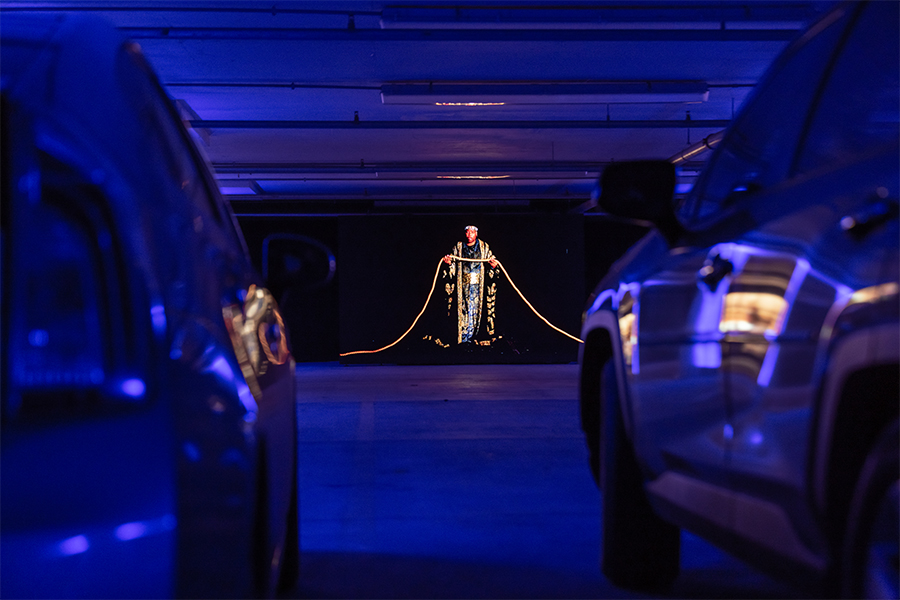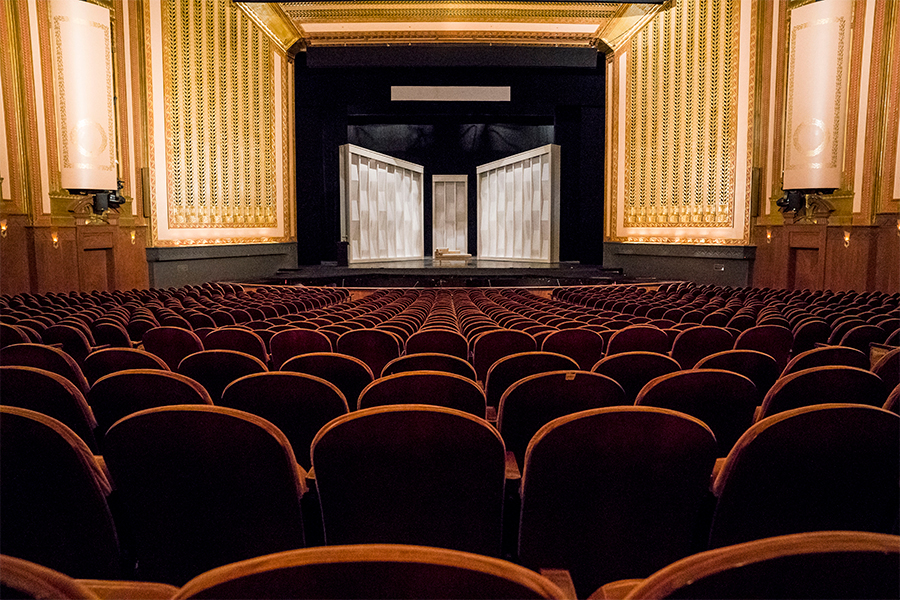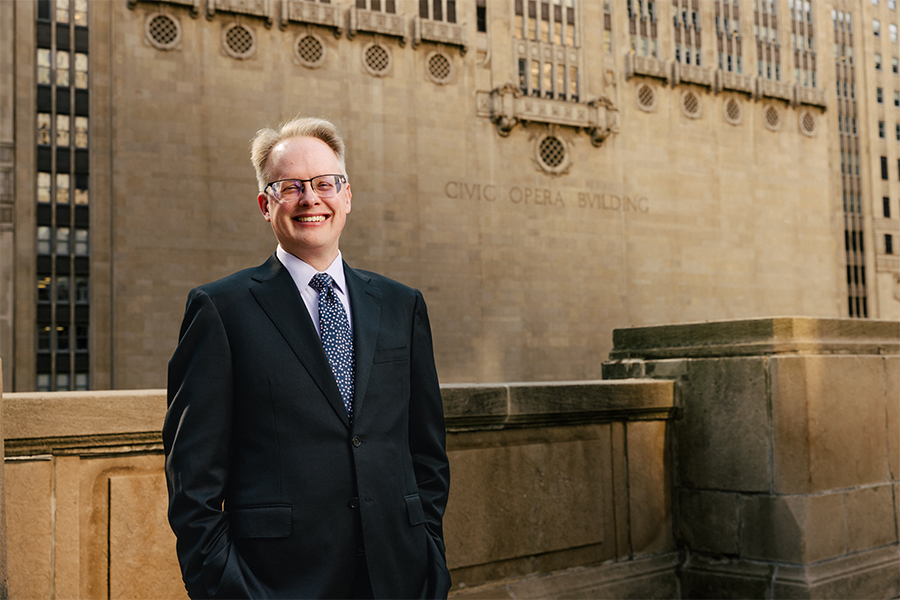September 20, 2024
A conversation with John Mangum
Recently, Lyric Opera of Chicago announced the appointment of John Mangum as the institution's fifth General Director, President & CEO. Mangum has dedicated his professional life to classical music at some of the country's foremost performing arts organizations, including the Houston Symphony, San Francisco Symphony, New York Philharmonic, and Los Angeles Philharmonic. He holds a doctorate in history and musicology, and has collaborated with many of the leading artists and conductors of today. He begins full-time duties in October.
You've mentioned that you caught the music bug in high school. What first captivated you?
There was always music around — the radio in the car, records at home, things like that. But in high school, I had several friends who were pretty serious about their instruments. Some of them played in the San Francisco Youth Symphony. One close friend was a very dedicated pianist, and I studied with his teacher for a while. I remember there was a phase where a bunch of us were obsessed with Glenn Gould. We were trying to get our hands on every one of his recordings. And then there was a phase where we were obsessed with German Romantic opera, like Freischütz and Fidelio and early Wagner — Dutchman and Lohengrin and Tannhäuser — and those kinds of works. It all really accelerated when a friend of mine brought a San Francisco Symphony brochure to school, for their Beethoven Festival in 1990. I remember I asked my parents to take me. It was the very well-known period instrument practitioner, conductor Roger Norrington. He was replicating something that he had done successfully in London, called the Beethoven Experience. The first night was symphonies, the 8th and the 9th. Then all day the second day, it was a series of lectures, chamber music, piano performances, illustrated talks about Beethoven's personality and creativity, and approaches to performance, culminating in a performance of the Missa Solemnis. I just had never experienced anything like it and got instantly hooked. I still have that brochure. It is framed, hanging on the wall in my office.
Will that make the trip to Lyric?
Of course. It's a little treasure that I've saved since my friend handed it to me when I was 15. Then the next pivotal experience for me was the Mozart year, in 1991. San Francisco Opera has a split season, and in June and July that year I saw the David Hockney Magic Flute, The Marriage of Figaro with Renée Fleming as the Countess, and a concert performance of Lucio Silla.
Quite a rarity! Your career has been largely in orchestral administration, but it sounds like opera is also a passion.
I guess I'm voraciously curious. My first encounters with classical music were really Beethoven and Mozart symphonies. And I had a reaction — it was like a rush. There's the thrill of that initial discovery, and hearing something new that's exciting, and you say, OK, how do I get more of that? What other Beethoven is there? Well, there's Fidelio. What other Mozart is there? Well, there are the DaPonte operas. And Zauberflöte. One satisfies as much of that curiosity as one possibly can. I think that's something that remains with me. I'm still trying to capture that feeling of elated discovery, of coming across something new that is musically really exciting.
Anything in the world of contemporary opera that you have found particularly engaging?
Oh, yes. I saw the Met Live in HD of Terence Blanchard's Fire Shut Up in My Bones, and I thought that was an incredibly successful undertaking — there was a real vitality to the storytelling and the musical construction. Then there are composers who are working in what I would call opera-adjacent spaces. Julia Wolfe is a really good example of that, especially her oratorio, Fire in my mouth, about the Triangle Shirtwaist fire in New York. At the end of last season I heard another work of hers, unEarth, with the New York Philharmonic. She is working in this storytelling space. When I was on the West Coast, I experienced the work of a company called The Industry — the mastermind there is Yuval Sharon, well-known to Lyric audiences. His projects there were precursors to innovative works at Lyric — Twilight: Gods and Proximity. They did a piece that was set in the train station in downtown Los Angeles called Invisible Cities that was incredibly powerful. There was a project called Hopscotch, where the opera scenes took place in cars moving around greater Los Angeles. They built a central viewing or experiencing area downtown called The Hub, where you saw what was going on in the cars and you could interface with or experience the different scenes. But then there was also a choice to actually start in a car and see the scene in the car, and then they would drop you off, and another car would pick you up.
It sounds quite innovative.
People might step back from something like that and say, Well, is it really opera? But it really does check those fundamental boxes of music and storytelling. I think projects that push the boundaries a little bit and subject the experience to rigorous examination and questioning can be quite interesting. Again, think about the success of Twilight: Gods at Lyric. Those kinds of experiments, while they're not necessarily possible in the physical structure of the Lyric Opera House, can inform the work that's done on the stage, whether it's a production of core repertoire or a commission of new work. We learn from those kinds of things and discover new ways to connect with audiences.

avery r. young as Norns in Lyric's innovative production of Twilight: Gods (2021), performed in the Millennium Lakeside Parking Garage.
In your time at Houston, there was a great deal of programming outside the concert hall. How do you see the role of a big organization like Lyric in a big city like Chicago?
It's really important to always be thinking about how the work you're doing is relevant to your community. Ultimately, that's who you serve, and that community has many different ways to potentially interface with the work that you're doing. A primary interface is attending performances in the Opera House. But there are lots of other ways. Lyric's Millennium Park concert is an excellent example. And all the work that Lyric Unlimited, the company's Learning and Civic Engagement division, does in the community. Then also thinking about how you are being accessible — how are you demystifying, if you will, the experience so that people feel welcome? One of the things that happened in San Francisco — not when I was growing up, but later when I was working there — was around the time of the opening of the season, the first production from San Francisco Opera would be simulcast into the San Francisco Giants' baseball stadium. That was led by Drew Landmesser, who worked at Lyric for a long time. For a segment of the city, that was the opera for them. They'd never set foot inside the War Memorial Opera House, but they went to AT&T Park and got hot dogs and nachos and ice cream and sat and watched the opera, which is really a beautiful thing.
So should we expect to see Lyric at Wrigley Field?
I make no promises! My first many months will be spent learning — learning about Chicago, learning about the community, learning about our audience, learning about how we best serve our city. I just cite that as an example of a really unexpected, outside the box, but very successful way to serve and connect with a community that might never think about setting foot inside an opera house.
All classical organizations, orchestras and operas, are facing challenges and seeking to grow audiences. What do you see as commonalities and differences?
First and foremost, in both cases, artistic excellence has to be the goal. Making sure that what you're putting on stage is absolutely in the front rank of what's happening nationally and internationally. That's definitely a commonality. I think also the nature of the business and the sources of revenue are similar. The need to sell tickets, combined with the need to raise significant philanthropic dollars to support the work and to support the service that the organizations provide to their community. A very important difference, pretty obvious, is that with opera, you're working with singers. There's something deeply personal when your instrument is physically located inside your body. It is a much more intimate thing. I think there is a real onus on the leader, and on everybody at an opera company, to create the conditions where it's possible for singers to make their art at the absolute top level. There's a component of creating an atmosphere where people can really feel at their best so that they can perform.

I'm sure you can't exactly play favorites — but do you have any favorite composers?
I can tell you, quite honestly, I am a fan of great music. I get excited about anything that's good, that's engaging, that's well-crafted. I love Mozart, Verdi, Wagner. Very big soft spot for Les Troyens by Berlioz, with great singers. Donizetti, Bellini, Rossini. And I am fond of some esoteric things. I love Russian opera — Rimsky-Korsakov, Tchaikovsky. I was really excited when they did Iolanta at the Met back in 2015. I'm pretty ecumenical in my tastes.
And your scholarly work had an earlier focus.
I love Handel operas. My specific area of academic interest was 18th-century opera seria. I wrote about a very narrow topic, which was opera seria in Berlin from 1740 to 1806, and the way that it was used to reflect and idealize political and social messages — and also then how that shifted over time as you move from a model of absolutist, enlightened monarchy to Napoleon. Handel is an example of that, par excellence.
You're especially expert in this period, clearly.
In my scholarly work, the paramount composer was Carl Heinrich Graun. He was the court composer to Frederick the Great in Berlin, and his operas were predominant there from 1740 to the mid 1780s. The other one was Johann Adolf Hasse — actually the court composer in Dresden, though his operas were also done in Berlin. His wife was one of the most famous sopranos of the day, Faustina Bordoni. She was one of the "rival queens" in Handel's opera company in London in the 1720s. When you hear some of those Handel operas, she was who he was writing for.
So can we expect a Graun festival at Lyric?
That would be about me, and the work that we need to do needs to be about Chicago and about our audience and our community. I will continue to enjoy my handful of Graun recordings.
For the curious among us, where should we start?
Montezuma — that was the second to last opera he composed. Frederick the Great wrote the libretto for it. Musically, it was really interesting because Frederick thought that da capo arias, with all the repetition and the decoration, interrupted and impeded the dramatic flow. He insisted that Graun write a lot of cavatinas, short AB pieces or even just A pieces that get cut off, to keep things moving. Mozart had no awareness of these works, but in a way, they point toward the more economic and dramatic flow of a Mozart opera.
So no Graun festival?
No Graun festival. Richard Bonynge conducted a disc of Montezuma highlights, with Joan Sutherland at her absolute peak. To get the full experience, done in an historically informed way, there's a recording of his Cleopatra e Cesare led by the wonderful René Jacobs.

On a more serious note, what do you see on the horizon for Lyric and for opera?
I'm incredibly optimistic about our art form. Why so? Well, it's been at the aspirational peak of artistic and human expression in Western culture for more than 400 years. Incredibly creative people have turned to this art form to say fundamental things about the human condition and our shared experience. That tells me we've got nothing to worry about because we still have this fundamental need to tell these stories that we all share. Opera is an incredible vehicle for that — to express these fundamental truths and tell these shared stories.
The challenges are real, though.
There are challenges. The work gets more expensive, and audiences change their patterns of consuming what we do. It's our job to stay on top of all that. Our job as one of the world's leading opera companies is to make sure that we do everything to continue to bring this art form to people. If you look back at the history of the opera, and you read about particular composers or particular premieres, it seems like there's always been a drum beat of, Oh, we don't have enough resources. It's a through-line. But somehow the art form always perseveres and thrives.
We seem to have a need for it.
In a moment where technology is increasingly and exponentially more intrusive, and it becomes harder and harder to find quiet spaces where we can have communal experiences, that's something that opera provides. It brings us together. We're all sharing the same moments. We're bringing our own frame of reference to it, but in a sense, we're together, we're communing. I think that's really at the root of opera's power. That's something that humans will fundamentally need into the future. As long as we keep our eye on the ball and continue to provide that, and continue to tell stories that resonate — whether those are stories that come from the timeless repertoire or new stories — opera's future is bright.
